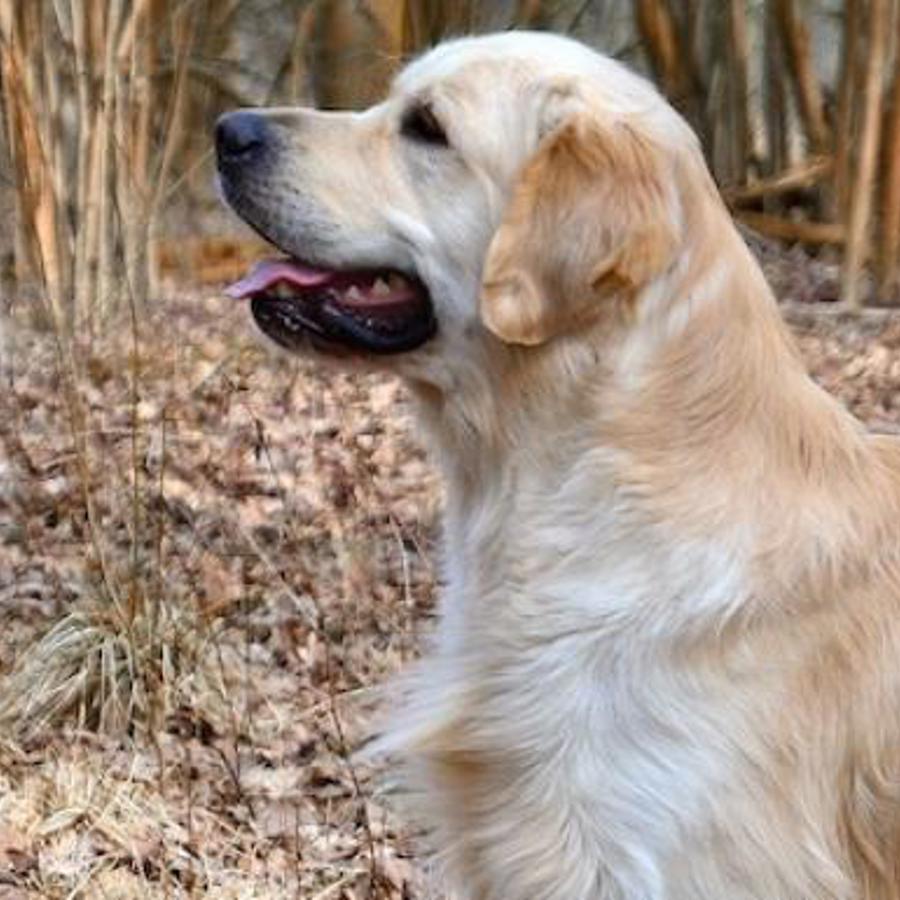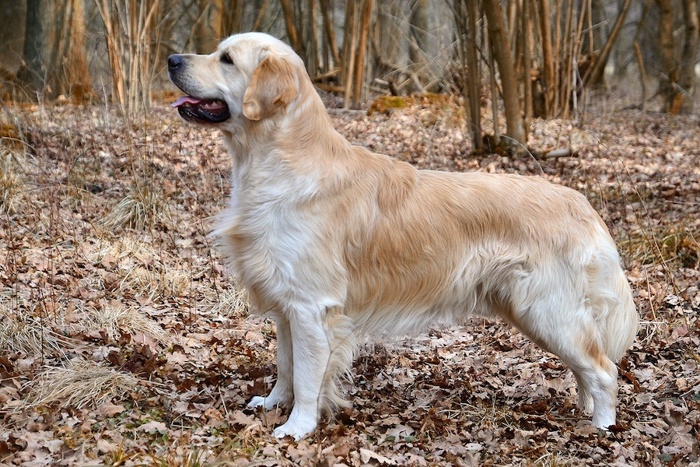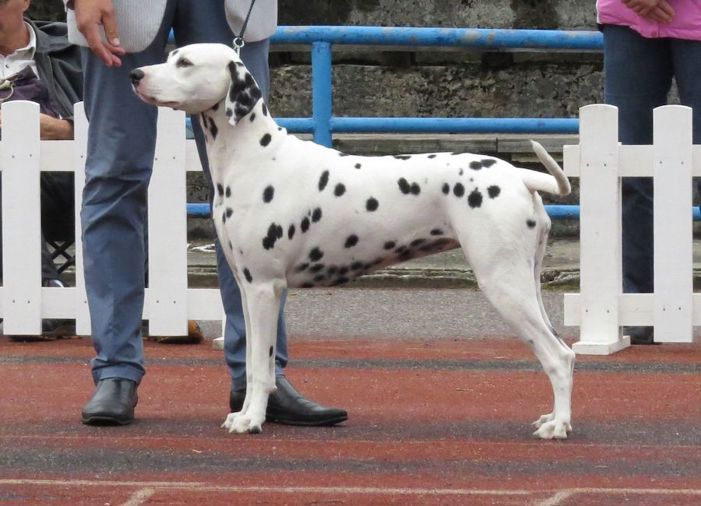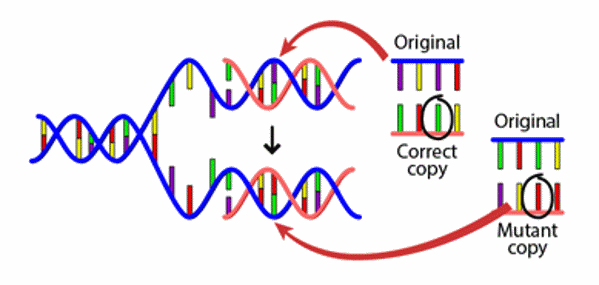
Why are golden retrievers so susceptible to cancer?
January 18, 2012

- Related Topics:
- Animal biology,
- Cancer,
- Intermarriage,
- Mutation
A curious adult from California asks:
"Why are golden retrievers so susceptible to cancer, particularly lymphoma? Other dogs also have been very popular and highly bred, but goldens get more than their share of this deadly disease."
We don't yet know exactly why 60% of golden retrievers will get cancer. We know this is about twice the rate for other dogs and we know it is definitely genetic. What we don't know yet is which specific genes are involved.
We also don't know why golden retrievers from the U.S. are more likely to end up with a form of cancer called hemangiosarcoma. Or why golden retrievers from the U.K. are more likely to get lymphoma. (Genetics almost certainly explains most of this difference too.)
Undoubtedly we will one day know all of these things. Dogs within a single breed are so alike genetically that it should be possible to find the responsible gene(s). Unfortunately, this inbreeding is also why golden retrievers get cancer so often in the first place.

Of course inbreeding doesn't always mean an increased risk for cancer. If that were the case, then all purebred dogs would have around the same cancer risk. They don't. But most of them do have other breed-specific health problems related to their inbreeding.
For example, golden retrievers get cancer. German shepherds suffer hip problems. Bulldogs have skin problems. Dalmatians get kidney stones. And so on.
The particular health problems a purebred dog has depends on its selected traits and what disease genes its founding ancestors were unlucky enough to have. The last part is called the "founder effect" and it happens in people too.
Basically the founding dogs of the golden retriever breed happened to have genes that increased their risk for cancer. Since all golden retrievers come from these founders and no new genes are being added to the gene pool, the cancer causing genes are recycled over and over in the population. For now, cancer is trapped in the golden retriever gene pool.
Everyone has Disease Genes
It isn't surprising that the ancestors of all golden retrievers had genes that increased their risk for getting cancer. Every animal (including dogs and people) have a few deadly genetic diseases lurking in their DNA. Two things keep us all from being riddled with those diseases though.
First, we tend to all have different sets of disease causing gene versions. And second, these diseases usually require that you get the bum gene from both mom and dad.
So to end up with a disease, both parents have to have a copy of the disease-causing gene version AND they both have to pass it down to you. This tends not to be very common unless the parents are related.
Related animals share more genes in common. This means that if they have kids, they are more likely to pass on many of the same gene versions including those that cause disease. The end result is increased risk for the diseases that run in that family.
This risk increases even more if the parents are very closely related. For example, if they are inbred for tens or hundreds of generations.
Golden retrievers, like every other pure breed of dogs, undoubtedly started from a small group of ancestors. Some of these dogs had a version of a gene that increased their risk for cancer. They passed this risk down to their pups. And down to every generation to the present day.
Since dog breeds started from so few ancestors such a short time ago, all dogs within a breed are essentially related. In nature this problem is usually solved by breeding outside of the family. But this isn't possible if a dog is to remain a purebred.
Goldens with Less Cancer
As I hinted at in the previous section, an obvious answer to solving golden retrievers' cancer problems is to stop the inbreeding. Simply breed golden retrievers with other dogs and in a few generations, the risk should drop down to normal levels. Of course then you'd lose some of the traits that people want in a golden retriever.
Another possibility is to find the gene involved, find golden retrievers that lack the gene version that increases their cancer risk, and breed only those dogs lacking the problem gene. The new golden retriever breed would then only have the usual 33% chance of getting cancer.
This sounds great in theory but may not be possible in practice. First off, it may be that golden retrievers all have two copies of the gene version that increases their risk for cancer. If this is the case, then it may not be easy to find any golden retrievers that don't have the trouble gene.
A second reason is that the disease version of the gene might be involved in some trait that makes a golden retriever a golden retriever (think golden coat). If this is the case, then if you breed out the disease, you end up with a dog that isn't a golden retriever anymore.
These issues sound theoretical, but they aren't. Something very similar happened with Dalmatians.
Dalmatians are especially prone to kidney stones instead of cancer. Researchers found that all Dalmatians had two copies of the version of the gene that led to kidney stones meaning there was no easy way to breed it away.
Breeders tried to engineer a Dalmatian without the kidney stone version of the gene by breeding them with the closely related Pointer. Eventually, through lots of breeding back with Dalmations, they got a dog that looked very much like a Dalmatian that didn't suffer from kidney stones. Except that its spots were never quite right.
Further study showed that Dalmatian spotting depended on the version of the gene that led to kidney stones. Get rid of kidney stones and you don't have a true Dalmatian anymore. If something similar is happening in golden retrievers, it may not be possible to make a golden retriever less cancer prone.
What this all means is that even if breeders find the responsible gene, they may not be able to do anything about golden retrievers' increased cancer risk if they want to keep the golden retriever breed as is. Luckily for the dogs, having a gene version that increases your risk for cancer does not mean you will for sure get cancer.

Cancer Genes
For the most part, people and dogs do not inherit genes that directly cause cancer. Instead they get genes that make them more likely to develop the disease.
What this means is that even if a dog inherits a gene like this, it won't get cancer for sure. And a pet owner may be able to make getting cancer less likely by controlling the animal's environment.
Cancer starts when a gene goes haywire and causes a cell to grow when it shouldn't (or to not die when it should). The gene goes bad because it gets damaged or mutated.
This mutation can come from the environment. That's why sunlight and certain chemicals can cause cancer. So if an owner keeps a dog away from harmful chemicals and other mutagens, it can decrease the dog's chances for cancer. But it won't eliminate them.
Mutations can also happen by accident when our cells are dividing. Each time a cell divides, it has to copy its DNA. Cells are very good at copying their DNA, but they aren't perfect. The occasional mistake slips through.

If that mistake is in a gene that controls growth, then the cell will grow uncontrollably. But this is usually only a problem if the mistake happens in both copies of a dog's (or person's) genes.
Animals that are at an increased risk for cancer often have one of their growth genes pre-mutated. This means they need just one mutation to end up with cancer. This is why they tend to get cancer both more often and at a younger age.
So even if golden retrievers end up with the "bad" version of the gene, they won't get cancer for sure. They'll just be at an increased risk.
Read More:
- Golden Retriever Club of America: Overview of cancer in golden retrievers
- How is cancer inherited (in humans and dogs)?
- If we live forever, is cancer inevitable?

Author: Dr. D. Barry Starr
Barry served as The Tech Geneticist from 2002-2018. He founded Ask-a-Geneticist, answered thousands of questions submitted by people from all around the world, and oversaw and edited all articles published during his tenure. AAG is part of the Stanford at The Tech program, which brings Stanford scientists to The Tech to answer questions for this site, as well as to run science activities with visitors at The Tech Interactive in downtown San Jose.
 Skip Navigation
Skip Navigation
